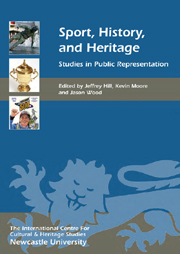Book contents
- Frontmatter
- Contents
- List of Illustrations
- Acknowledgments
- Sport, History and Heritage: An Investigation into the Public Representation of Sport – Editors' General Introduction
- HISTORY, HERITAGE AND SPORT
- 1 Sport, History and Imagined Pasts
- 2 Discredited Class-war Fable or Priceless Promotional Asset? The Duality of Rugby Union's William Webb Ellis Foundation Myth
- 3 Cricket Writing, Heritage and Ideology
- 4 Football and the Fine Arts: The Football Association Art Competition and Exhibition, 1953
- 5 ‘It's Nice to Belong’: Boxing, Heritage and Community in London
- 6 Television and the ‘Austerity Games’: London 1948
- MUSEUMS AND THE REPRESENTATION OF SPORT
- SURVIVALS AND LEGACIES: SPORT, HERITAGE AND IDENTITY
- Afterword: History and Heritage in Sport
- List of Contributors
- Index
- HERITAGE MATTERS
2 - Discredited Class-war Fable or Priceless Promotional Asset? The Duality of Rugby Union's William Webb Ellis Foundation Myth
from HISTORY, HERITAGE AND SPORT
Published online by Cambridge University Press: 05 April 2013
- Frontmatter
- Contents
- List of Illustrations
- Acknowledgments
- Sport, History and Heritage: An Investigation into the Public Representation of Sport – Editors' General Introduction
- HISTORY, HERITAGE AND SPORT
- 1 Sport, History and Imagined Pasts
- 2 Discredited Class-war Fable or Priceless Promotional Asset? The Duality of Rugby Union's William Webb Ellis Foundation Myth
- 3 Cricket Writing, Heritage and Ideology
- 4 Football and the Fine Arts: The Football Association Art Competition and Exhibition, 1953
- 5 ‘It's Nice to Belong’: Boxing, Heritage and Community in London
- 6 Television and the ‘Austerity Games’: London 1948
- MUSEUMS AND THE REPRESENTATION OF SPORT
- SURVIVALS AND LEGACIES: SPORT, HERITAGE AND IDENTITY
- Afterword: History and Heritage in Sport
- List of Contributors
- Index
- HERITAGE MATTERS
Summary
INTRODUCTION
The very first words in Tony Collins' definitive A Social History of English Rugby Union offer no ambiguity: ‘Of the little that is known about William Webb Ellis, we can be certain of one thing, he did not invent the game of rugby football’ (Collins 2009, vii). Collins' statement is a direct strike against the traditional story that sits as the foundation stone of rugby football history: that Ellis, in 1823, took the ball in his arms during a game at Rugby School and ran forwards with it, thus creating the defining feature of the sport of rugby football. Collins' claim that Ellis played no role in either the creation or evolution of the game would not have raised a single eyebrow among those who have actually taken the time to examine the origins of rugby football. The view that the William Webb Ellis foundation story is a myth, with no more truth behind it than a fanciful piece of fiction, is one shared by the majority of those that have assessed the primary evidence with impartial eyes.
As a perspective on the game's origins, the view articulated by Collins has had currency for many decades and a completely unchallenged consensus within academic circles in recent years. However, shortly after Collins' book was published, England's Rugby Football Union (RFU) – the largest national governing body among the many rugby-playing nations – decided that one of its major administrative buildings was to be renamed ‘Webb Ellis House’ in honour of rugby football's ‘founding father’.
- Type
- Chapter
- Information
- Sport, History, and HeritageStudies in Public Representation, pp. 19 - 32Publisher: Boydell & BrewerPrint publication year: 2012



